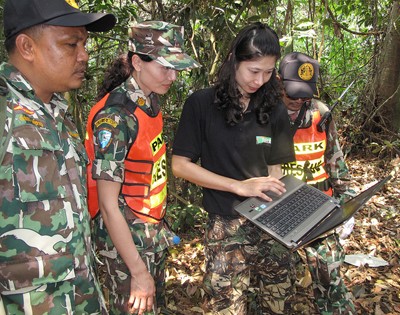Speeches Shim

The illegal trade of wildlife represents one of the largest threats to biodiversity in Asia. Wildlife trafficking is the fourth largest black market in the world, with an estimated annual value of $20 billion. The unsustainable wildlife trade also degrades the health of ecosystems, human health, governance structures, and economies. Overfishing and destructive fishing practices are also quickly depleting shared marine resources, increasing the demand for illegal, unreported, and unregulated fishing, which is estimated to cost as much as $23 billion in annual losses. As Asia develops and regional connectivity increases, so does the need for protection of the region’s globally important natural resources. In response to these threats, USAID oversees two flagship regional biodiversity programs: USAID Wildlife Asia and the Oceans and Fisheries Partnership.
USAID Wildlife Asia
USAID, working closely with the Association of Southeast Asian Nations (ASEAN), addresses wildlife trafficking as a transnational crime through USAID Wildlife Asia. The activity works to reduce consumer demand for wildlife parts and products, strengthen law enforcement capacity and coordination, enhance policy, legislation and jurisprudence, and improve regional action to reduce wildlife crime in Southeast Asia and China. Elephant ivory, rhino horn, and tiger and pangolin products are among the top items illegally-traded worldwide, especially in Southeast Asia and China. Transcontinental organized wildlife crime destroys wildlife populations and wildlife-based livelihoods, creating social and political instability. Wildlife trafficking undermines the rule of law, supports corruption and money laundering, spreads zoonotic diseases and has links to organized criminal networks. It is a security issue as much as a conservation issue.
The Oceans and Fisheries Partnership
The Oceans and Fisheries Partnership (USAID Oceans), a partnership between USAID, the Southeast Asian Fisheries Development Center, and the Coral Triangle for Coral Reefs, Fisheries and Food Security, works to strengthen regional cooperation to combat illegal, unreported and unregulated fishing, promote sustainable fisheries, and conserve marine biodiversity in the Asia-Pacific region. Southeast Asia houses some of the world's most productive and biodiverse marine ecosystems in the world. These ecosystems provide food and income to over 200 million people in the region; however, unsustainable fishing practices threaten biodiversity, food security, and livelihoods. USAID Oceans supports the development of a transparent and financially sustainable catch documentation and traceability system to help ensure that fisheries resources are legally caught and properly labeled.

Comment
Make a general inquiry or suggest an improvement.